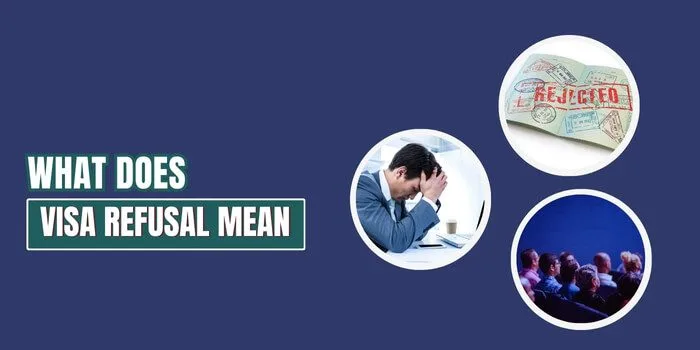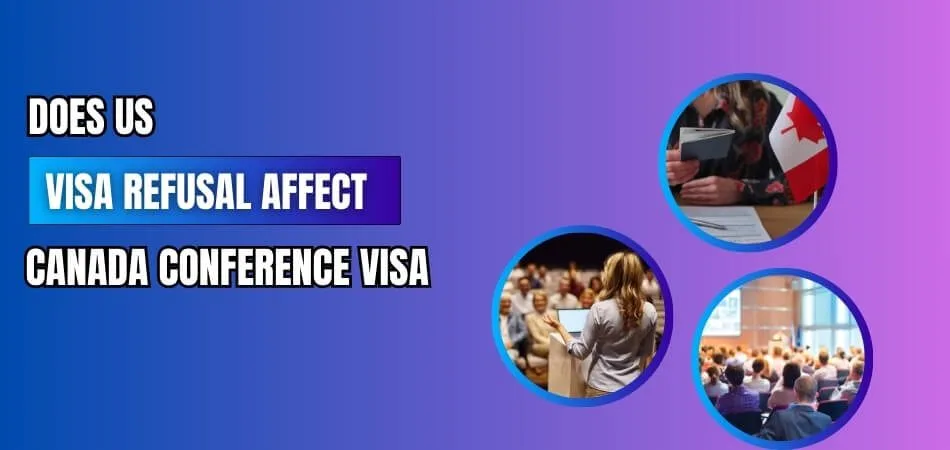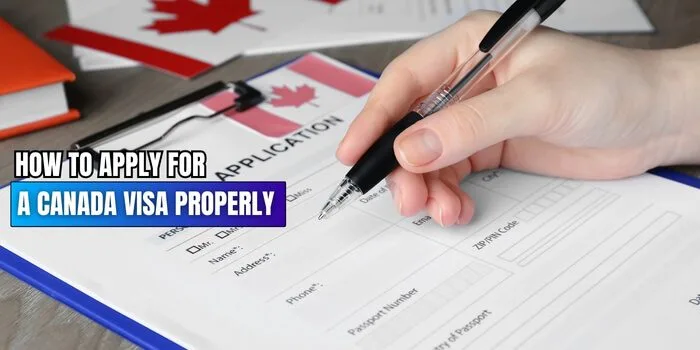Conference visas are essential for professionals and academics looking to attend international meetings or events, facilitating global exchange and networking. A question that often arises is, “Does US visa refusal affect Canada conference visa?”
Yes, a refusal from the US can have implications on your Canadian visa application. Canadian authorities may consider a previous US visa refusal during their assessment process. Therefore, applicants must be prepared to provide a comprehensive explanation for any refusal on their Canadian visa application form.
This article dives into the complexities of how a US visa refusal can impact your application for a Canada conference visa and offers guidance on dealing with this situation. Read on to learn more about how to ensure a smooth application process.
What Does Visa Refusal Mean?
Visa refusal is when a consulate or embassy decides you don’t meet the entry requirements. This decision delays your travel plans, requiring you to rethink your situation. It often leads to disappointment but also an opportunity for reevaluation.
Having an understanding of why your application was denied can help you with future applications. Authorities provide reasons to guide you in resolving these issues next time. It’s a learning curve that most travelers experience at least once.
Despite being disheartening, a refusal is not the end of the road. By making the appropriate adjustments and providing the required documentation, such as an invitation letter or supporting documents from a well-known conference organizer, you can reapply successfully. It’s all about perseverance and improving your application based on feedback
Why Do Visa Applications Get Rejected?
The visa application process can sometimes seem like a complex puzzle. The approval process requires every piece to be perfect, yet rejection reasons vary. By understanding these reasons, you can significantly improve your chances of success.
- Incomplete Applications: Often, applications are turned down because they’re not filled out entirely. Missing information leads to doubts about the applicant’s intentions or qualifications.
- Insufficient Funds: Proving financial stability is key; without it, officials may question your ability to support yourself during your stay. Lack of adequate funds is a common ground for denial.
- Unclear Travel Plans: An unclear itinerary or purpose of the visit raises suspicions. A well-defined travel plan is crucial for approval.
- Past or Present Criminal Activities: Any history of legal issues can adversely affect your application. Authorities are cautious about admitting individuals with a criminal background.
- Document Forgery: Submitting fake or altered documents is a serious offense. This not only leads to immediate refusal but can also ban future applications.
- Visa History Issues: Previous visa violations or overstays can haunt your current application. A clean visa history promotes trust and reliability.
By addressing these common issues, applicants can improve their chances of approval. Remember, each rejection is an opportunity to learn and refine your application for the next attempt.
Does US Visa Refusal Affect Canada Conference Visa?
Yes, a US visa refusal can indeed influence your application for a Canada conference visa. When applying for a visa, each country’s embassy or consulate reviews your application independently. However, they may consider your travel history, including any visa refusals, as part of their assessment.
Here is a detailed explanation of does US visa refusal affects Canada conference visa:
Application Integrity
A refusal from the US may prompt Canadian authorities to scrutinize your application more closely. They seek to understand the reasons behind the refusal to ensure that all entry requirements are met. This is especially important for those traveling for professional events, such as conferences in Canada, where proper documentation is essential. Honest disclosure of past refusals can demonstrate your integrity.
Travel History
Your travel history reflects your compliance with international visa regulations. A US visa refusal is part of this history. Canadian officials may consider it to gauge your reliability as a traveler. A pattern of refusals could raise concerns about your application.
Reasons for Refusal
The specific reasons for US visa refusal are crucial. If the refusal was for a minor documentation error, it might have less impact. However, reasons related to security or immigration violations could be more concerning. Canadian authorities assess these reasons in the context of their own policies.
Documentation and Explanation
Providing comprehensive documentation and a clear explanation of any visa refusal is key. This allows Canadian officials to understand the circumstances of the refusal. Transparent communication can mitigate potential negative effects. It’s an opportunity to clarify any misunderstandings.
A US visa refusal can affect your application for a Canada conference visa, but the impact depends largely on what the reasons are and how you address them. Clear, honest communication and thorough documentation are your best strategies for minimizing any negative impact.
What are the Requirements for a Canada Conference Visa?
The application process for a Canada conference visa involves meeting specific criteria to ensure your entry for the event. This process is designed to confirm your intentions are genuine and you meet Canada’s standards for temporary visitors. Here are the essential visa requirements you’ll need to meet.
- Valid Passport: Your passport must be valid for the duration of your stay. It serves as the primary identification document for your application.
- Invitation Letter: An official invitation from the conference organizers is required. This letter should detail your role and the event’s nature.
- Proof of Financial Support: You must demonstrate financial stability to cover your expenses. Bank statements or sponsorship letters can serve as proof.
- Travel Itinerary: Providing a detailed travel plan, including dates and accommodations, is crucial. This shows you have a clear schedule for your visit.
- Ties to Home Country: Evidence of strong ties to your home country ensures you will return post-conference. Employment or family obligations can act as proof.
- Application Fee: Payment of the non-refundable application fee is mandatory. This fee covers the cost of processing your visa application.
By successfully meeting these requirements, you will be able to attend your conference in Canada. To ensure a successful application, ensure your preparation is complete and your documentation is clear.
How to Apply for a Canada Visa Properly?
The process of applying for a Canada visa requires accuracy, patience, and attention to every detail. By understanding and meticulously following the steps, applicants can maximize their chances of being approved.
Here is a step-by-step process of how to apply for a Canada visa properly.
Step 1: Determine Visa Type
Identify the correct visa type based on your visit’s purpose, such as tourism, business, study, or work. This step is crucial as it dictates the specific requirements, documents, and application form you’ll need. The Canadian government’s official website provides a helpful tool to guide you in selecting the appropriate visa category.
Step 2: Complete the Application Form
Access and complete the application form available on the Immigration, Refugees, and Citizenship Canada (IRCC) website. Double-check your responses for accuracy and completeness to prevent any processing delays. Misinformation can lead to application denial.
Step 3: Gather Required Documents
Assemble all necessary documentation, including a valid passport, recent photographs conforming to the specified dimensions, financial proofs (such as bank statements or a letter of sponsorship), a detailed itinerary, and any other documents that support your visa category. Each document should be current and valid, clearly indicating your eligibility and intent.
Step 4: Pay the Application Fee
The visa application fee, which varies by visa type, must be paid online via the IRCC website using a credit or debit card. Ensure to save the payment receipt, as it’s a crucial part of your application package. This fee is non-refundable, even if the visa application is not successful.
Step 5: Schedule an Interview (if required)
Depending on your nationality and the specific visa you’re applying for, an interview with a Canadian visa officer at your local consulate or embassy might be required. If applicable, schedule your interview promptly and prepare by reviewing potential questions and organizing your documents for presentation.
Step 6: Submit Your Application
Choose to submit your application either online or through a Visa Application Center (VAC) based on your convenience and requirements. Online submissions are straightforward and efficient while submitting through a VAC might incur an additional service charge. Ensure your application packet is complete with all required documents and the application fee receipt.
Step 7: Wait for Processing and Provide Additional Information if Requested
The processing times for Canada visas can vary significantly based on the visa type and applicant’s country. During this period, be patient and monitor your email for any communication from the consulate or embassy. They may request additional information or documents, which you should provide promptly to avoid further delays.
By following these steps, you’re well-prepared to manage the Canada visa application process. Remember, thorough preparation and clear, honest documentation are key to a successful visa application.
Frequently Asked Questions about Does US Visa Refusal Affect Canada Conference Visa?
Here are some of the FAQs and their relevant answers for a clear concept about does US visa refusal affects Canada conference visa:
Can a US Visa Refusal Affect My Chances of Obtaining a Canada Conference Visa Even if The Reasons Were Minor?
Yes, Canadian authorities consider all aspects of your visa history, including minor reasons for refusal, during their assessment process. It’s essential to provide a comprehensive explanation for any refusal.
Will a US Visa Refusal Impact My Canada Conference Visa Application if It Happened Several Years Ago?
Yes, Canadian authorities typically review your entire visa history, regardless of how long ago the refusal occurred. They assess your overall compliance with visa regulations to ensure entry eligibility.
Does a US Visa Refusal Automatically Result in Denial of My Canada Conference Visa Application?
Not necessarily. While a US visa refusal can raise concerns, Canadian authorities evaluate each application individually. Providing sufficient documentation and a clear explanation may mitigate the impact of the refusal.
If I’ve Been Refused a US Visa Multiple Times, Will It Significantly Affect My Canada Conference Visa Application?
Multiple US visa refusals may raise red flags during the Canada visa assessment. However, demonstrating strong ties to your home country and addressing reasons for previous refusals can help improve your application’s chances.
Can I Appeal a US Visa Refusal to Improve My Prospects for A Canada Conference Visa?
While appeals for US visa refusals are possible, they may not directly influence your Canada conference visa application. Focus on providing compelling evidence and explanations within your Canada visa application instead.
Conclusion
Experiencing a US visa refusal can indeed impact your Canada conference visa application process. However, by being transparent and providing thorough explanations, you can mitigate its effects.
Addressing concerns like “Does US visa refusal affect Canada conference visa?” requires attention to detail and strategic planning. With clear communication and adherence to requirements, applicants can enhance their chances of success.
Ultimately, preparation and honesty are key in ensuring a smooth visa application process, allowing professionals and academics to participate in valuable international conferences without unnecessary hassles.








